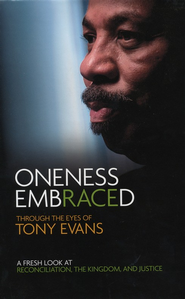In his book entitled Oneness Embraced through the Eyes of Tony Evans: A Fresh Look At Reconciliation, the Kingdom, and Justice, pastor and theologian, Dr. Tony Evans, takes a biblical look at these challenging topics.
 Foundational to Dr. Evans teaching, preaching, and writing is what he refers to as the kingdom agenda. “The kingdom agenda is the visible manifestation of the comprehensive rule of God over every area of life. It is a reminder that we, as followers, of Jesus Christ, belong to another realm, our allegiance is in another order, and no matter where we live, work, or travel, we are citizens of God’s kingdom (42).”
Foundational to Dr. Evans teaching, preaching, and writing is what he refers to as the kingdom agenda. “The kingdom agenda is the visible manifestation of the comprehensive rule of God over every area of life. It is a reminder that we, as followers, of Jesus Christ, belong to another realm, our allegiance is in another order, and no matter where we live, work, or travel, we are citizens of God’s kingdom (42).”
Dr. Evans takes this ministry approach based on Jesus prayer for God’s will to “be done on earth as it is in heaven (Matthew 6:10)” God’s will is to restore everything that was lost and broken as a result of the original sin that took place in the Garden of Eden.
God wants to restore his earthly creation to his likeness and that’s why he sent Jesus to die on the cross in the first place. Jesus revealed that his life’s mission was to fulfill the commandments by uniting us in love to God and each other. “The Lord our God, the Lord is one. Love the Lord your God with all your heart and with all your soul and with all your mind and with all your strength. The second is this: Love your neighbor as yourself (Mark 12: 29b-31a).”
Our God is one of love, unity, and reconciliation. I say this with the understanding that, “Reconciliation is not an end in itself. It is a means toward the greater end of bringing glory to God through seeking to advance His kingdom in a lost world. Therefore, authentic oneness manifests itself through mutual relationship and service, not in seminars (pg 19).”
When someone mentions racial reconciliation, the first thing that people want to do is have a cross-cultural program or event. If you have to label something as “racial reconciliation,” there is probably not a lot of reconciling going on. There will most certainly be smiles and tolerance, but not the reconciliation discussed in the scriptures.
“Biblical racial reconciliation may be defined as addressing the sin that cause the divide for the purpose of bonding together across racial lines based on a shared commitment to Jesus Christ with the goal of service to others (pg 32).”
The sin of racism in our country cannot be denied. While we should not continue to dwell on those issues for the sake of maintaining division, we must certainly continue dialog about the subtle and not so subtle ways that racism continues in today’s culture (in the areas of education, health care, employment, and even in the church).
If you are a devout Christian, and your church is heavily populated by one race of people, I challenge you to ask the questions, “Why is my church segregated? How does God feel about that? What am I going to do about it?”
Here’s the truth: Sin have affected all of us! When concerning American history, the church has been on both sides of the fence concerning racial injustices. We are being reminded again and again that racial divides also lead to social, economic divides and divisions in other areas as well. These things should not be.
In a time of natural disasters, wars and political uprising, economic downturn, and so much uncertainty, “the church should be a model, as such as time as this, to reveal to the world what true oneness, equality, and freedom can produce (31).”
We are all created in God’s image, and Jesus gives us hope that we can walk in the strength of that reality through the power of the Holy Spirit. Walking as God’s image bearers purposed for reconciliation means that we understand:
1. God created us differently and those differences should be valued and embraced.
2. Acknowledging our differences may be uncomfortable, but I have something to offer my sisters and brothers from a different race, and I also have much to learn from them.
3. Racial reconciliation cannot be achieved through programs, but we must intentionally pursue relationships with people from various races.
This is a phenomenal read for those interested in the topic of racial reconciliation or any of the topics in the subtitle. There is far too much in cover in one blog post, but I’m sure we will revisit this resource together again.
What are some misconceptions that you have about people that are different than you? How does that make you uncomfortable?
| © Natasha S. Robinson 2011 |
I like Dr. Evans teaching and thank you for this post. Funny, I was thinking about this last night. I’m not sure if there can ever be racial reconciliation. I guess it has to happen in churches first. A lot of healing needs to happen. I’m just not sure where one should start. I guess one person at a time.